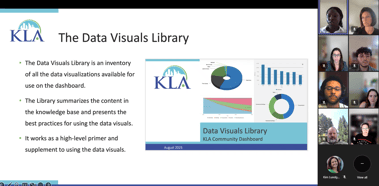.png?width=436&height=352&name=MicrosoftTeams-image%20(31).png)

Guest Post by Dunia Seidu, KLA Summer 2023 Climate Storytelling Intern.
Dunia is a rising senior studying English at the University of Massachusetts Lowell. As Climate Storytelling Intern, she worked with a range of KLA clients, like Cambridge, to tell stories about their current efforts to address and adapt to climate change.
The City of Cambridge has announced a new pilot partnership with BlocPower, is a climate technology company that analyzes, finances and upgrades homes and buildings, becoming the first city in New England to work with the climate technology company on building decarbonization.
Why Building Decarbonization?
In the U.S, residential and commercial buildings make up almost 30% of greenhouse gas (GHG) emissions, making building decarbonization an incredibly pressing issue as cities and towns continue to grow.

Images from Dunia's final intern project presentation to KLA Staff, which covered storytelling mechanisms for client work.
Reducing the GHG emissions of buildings can involve a variety of approaches:
- Removing a building’s dependence on natural gas or fuel oil and using electricity for heating and cooling instead.
- Designing the building to use more natural lighting and be better insulated.
- Utilizing materials with less embodied carbon.
What’s different for Cambridge?
BlocPower’s approach to building decarbonization in Cambridge will focus specifically on retrofitting multifamily buildings with 5+ units over one year. In this pilot, they will:
- Identify buildings due for upgrades and estimate the cost and scope of work with BlocPower’s software.
- Work on modifying these buildings by improving energy efficiency, incorporating solar power, and electrifying their heating, cooling, and hot water systems.
Overcoming challenges with building decarbonization:
When it comes to decarbonizing buildings, especially after construction, city planners often run into a few obstacles that slow down or prevent the process.
For instance, costs can be prohibitive and dissuade owners from engaging in these efforts: even if buildings have been constructed with minimal embodied carbon, the owner can choose to install energy inefficient appliances, maintain natural gas usage, and avoid using heat pumps post-construction because it saves them money in the short term.
Cambridge’s partnership with BlocPower directly tackles this by:
- Ensuring program participants will be able to finance the building retrofits without initial payments or liens.
- Providing project oversight that takes much of the load of project management off the individual.
- Connecting participants to state and federal incentives.
This approach supports lower income communities, which are disproportionately affected by the impacts of climate change. Supporting programs like this promotes equity, as low-income households have a better chance of participating in the program with financing options.
Looking forward with Cambridge and KLA:
What’s guiding this process is Cambridge’s Net Zero Action Plan, a document hosted on their Resilient Cambridge dashboard that maps out the path to achieving carbon neutrality in the city’s buildings by 2050. The City’s partnership with BlocPower marks a serious step forward in the community’s
Taking advantage of the building retrofits achieves their first step in the action plan, and Cambridge taking the lead with BlocPower makes them one of many standout communities that KLA works with in New England.
Building decarbonization is a process that needs work on all levels, but there are steps individuals can take to limit their building emissions in home or office spaces:
- Opt into weatherization programs that often have federal or state assistance that help to cover the cost of making homes more energy efficient.
- Purchase energy efficient appliances.
- Use less energy at home with basic techniques like using natural light, turning lights off when not in use, and using a timer on air conditioning systems.
--
Read our other 2023 KLA Summer Interns' blogs here:
Nathan Abreu-Cruz, Climate Analysis Intern: Choosing Climate Metrics that Matter
Saahithi Achanta: How Can Climate Communication Drive Behavior Change?
